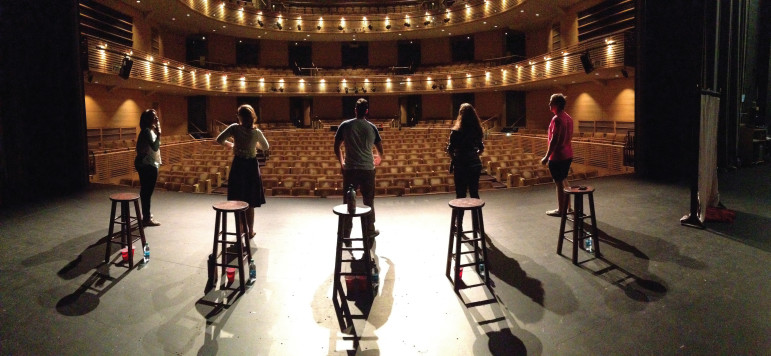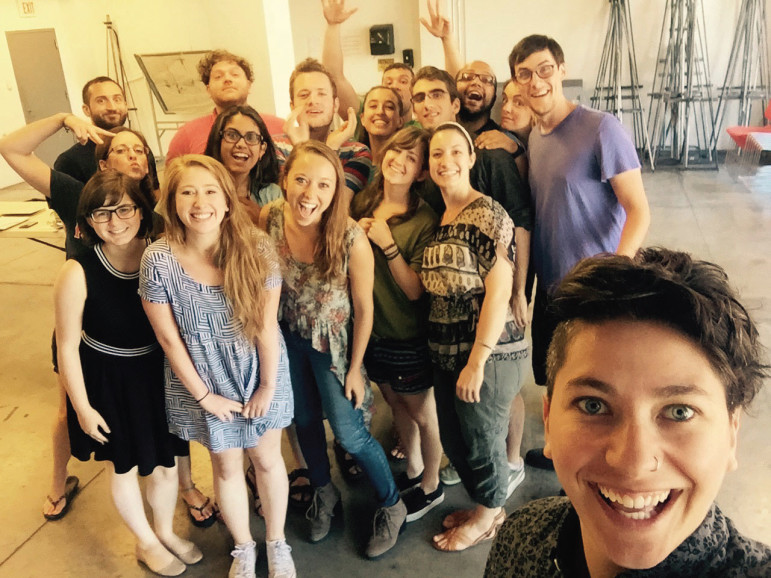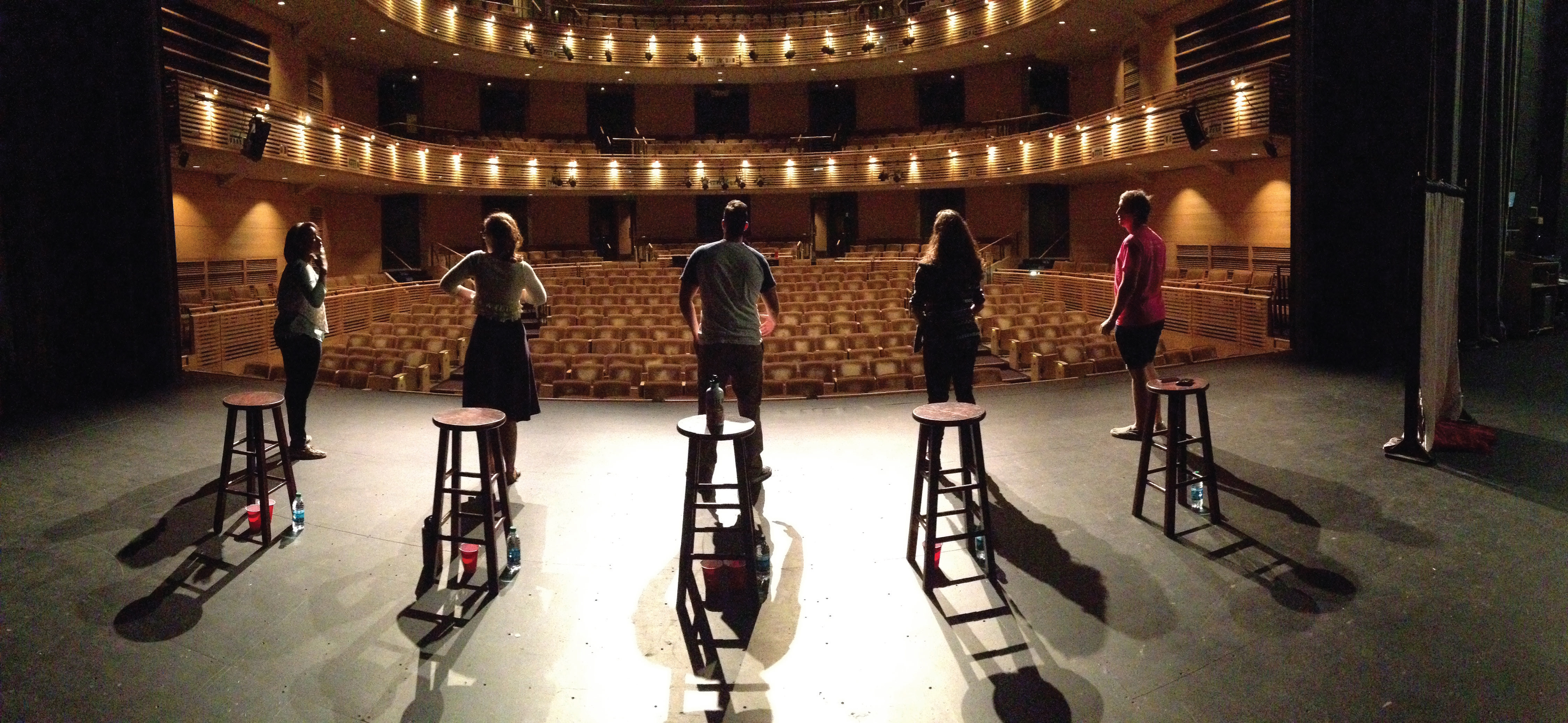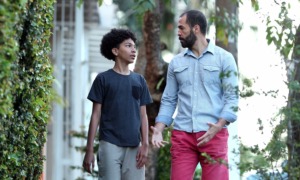
Photos courtesy of speak about it, inc.
Peer educators (from left) Maritza Bostic, Kathleen Fletcher, Jay Connolly, Kristen DiMercurio and Zack Reardon with the nonprofit Speak About It prepare for a performance at Williams College.
When Nicole York was in school, she was the kind of girl everyone could go to with their troubles.
Friends would pull her aside in hallways, lunchrooms and after the last bell had rung to talk about problems with parents, siblings and schoolyard bullies. She was at ease listening to others, making them feel understood and working with them to find solutions.
As she got older, her girlfriends would come to her with stories of “boy troubles” that had some kind of abuse in them. York had witnessed domestic abuse as a child and knew the kinds of scars it could leave behind. Her realization that abuse was happening in the lives of her friends as well spurred her interest in adding peer educator and advocate to her role as a confidant.
She wanted to find ways to prevent teen dating violence before it ever started, to make sure everyone had someone they could trust.
Today, York, 21, chairs the National Youth Advisory Board at loveisrespect, a nonprofit group that aims to empower youth to end dating abuse.
The group runs a hotline that teens and young adults can call, text or chat with online for advice about their lives. When they call, the voice on the other end of the line is someone just like them: a teenager or a young adult learning about how to build healthy relationships, someone who could be a friend but also has training and resources.
“You know it’s a safe person. You don’t always know that you can talk with the people you interact with every day,” said York.
Through the hotline, teens can ask confidential questions about whether they should worry about a partner’s behavior or find out about where they can turn for help if they’re in an abusive relationship. And because they’re talking to a peer, they don’t have to explain what Instagram is or how Snapchat works.
The hotline’s reliance on trained peer advocates is one way organizations across the country are making sure teenagers’ perspectives guide efforts to prevent and end dating violence among youth, which can be physical, sexual, psychological and emotional — in person or online.
In a 2013 survey by the Centers for Disease Control and Prevention, 10 percent of high schoolers reported physical victimization, and 10 percent reported sexual victimization from a dating partner during the previous year.
Teenagers who experience dating violence are more likely to have symptoms of depression and anxiety, use tobacco, drugs or alcohol, and have suicidal thoughts, according to the CDC. They also are at higher risk for victimization during college.
One key way to end dating violence among teens, asserts the CDC, is prevention.
Start with healthy relationships
Prevention doesn’t just mean defining what abuse looks like. It also means encouraging teens and young adults to talk about what a healthy relationship is.
“We all have a starting place in relationships. A lot of this is about setting boundaries and learning what red flags are,” said Brian Pinero, chief programs officer for the National Domestic Violence Hotline and loveisrespect.
In addition to running the national teen dating hotline, loveisrespect offers online resources, trainings, curricula and toolkits for use in and out of school. The project is a partnership between the National Domestic Violence Hotline (see op-ed, page 5) and Break the Cycle, a national nonprofit that provides comprehensive dating abuse programs to young people ages 12 to 24.
The organizations have discovered that it is often easier to start a conversation about what makes a healthy relationship than to jump into a discussion of abuse. A discussion about effective communication techniques can be what encourages a teen to think about how their partner speaks to them, and whether it has become violent, Pinero said.
When a peer leads someone seeking help through those kinds of questions, they can discover answers on their own, rather than in a top-down format.
“They’re creating a really special place where kids are finding information,” he said.

Shana Natelson (foreground), Speak About It executive director, takes a selfie with the group’s peer educators/actors; program coordinator, Kaylee Wolfe (at left, wearing black dress) and creative director, David Surkin (back row, in the red shirt) during rehearsal and training in Portland, Maine.
A space for conversation
Sometimes it pays to take a step even further back to learn how to talk about the kinds of important conversations that keep a relationship healthy, say the leaders of Speak About It, a nonprofit performance group based in Maine that talks with young people about sexual consent, boundaries and healthy relationships.
The college-aged and young-adult actors present skits, monologues and dialogues to college and high school-aged audiences, reaching 80,000 youth since 2011. Not too long ago, they were the same age as their audience members.
“We really feel there is value in the people in the audience seeing themselves represented,” said Kaylee Wolfe, the group’s program coordinator.
But that’s the only the first layer of peer education at Speak About It. They also look for ways for audience members to become leaders among their classmates.
Originally, the actors would lead post-show conversations with their audiences, but they’ve shifted to a model where they meet before the show with a group of teens or young adults to find out what’s on the minds of that particular group of students.
After the show, those students help lead a conversation based on the show and the first round of discussion, tailoring the session to the needs of their community.
“I think a big part of peer education is creating a space where they feel ownership over the conversation,” said Wolfe.
Wolfe said she thinks of the show and conversations as seeds. Students learn how to start talking about healthy sexual relationships during the Speak About It visit. They then have the tools to continue that conversation long after the performance.
Consider technology
No matter the model for encouraging teens to learn about dating violence, nonprofit leaders say technology should be a key consideration for organizers, both for connecting with youth and understanding their experiences.
Teens want to get information on various platforms, and their relationships often have an online dimension, said the National Domestic Violence Hotline’s Pinero.
The National Youth Advisory Board acts as a fact check for adults at loveisresepct, said York. The teens keep their adult advisors up to date on trends and preferences in their communities. That makes for the strongest resources to provide to teens and the adults in their lives.
Then it’s up to peer educators to find the best way to share those resources when they connect with someone on the phone, online or in person. They may help design a safety plan, share tips about relationships, or make referrals using loveisrespect’s toolkits and curriculums.
Often, finding ways to best serve teenagers means stepping aside to let teenagers lead, said Jasmine Uribe, leadership and engagement manager at Break the Cycle and loveisrespect.
“It sometimes means we put our agenda to [the] side and let them go,” she said. “We really want to empower them to create change for their peers in their own words.”
Resources
Break the Cycle (breakthecycle.org) offers access to curricula, toolkits and resources for community education and activism, including handouts and posters.
Centers for Disease Control and Prevention offers a variety of resources (cdc.gov/ violenceprevention/intimatepartnerviolence/ teen_dating_violence.html) including “Dating Matters,” an interactive training for educators and youth-serving organizations and strategies to promote healthy relationships.
loveisrespect.org offers information about the teen dating violence hotline, quizzes and resources for youth and adults. The loveisrespect National Youth Advisory Board leads Respect Week, Feb. 8-12, during Teen Dating Violence Awareness Month. Events include Wear Orange 4 Love, a national day of awareness and the release of a national respect announcement.
National Sexual Violence Resource Center (nsvrc.org) “acts as a communication hub,” according to its website, “connecting people with the information, resources, tools, and expertise needed to effectively address and prevent sexual violence in all communities.”
Speak About It (speakaboutitonline. com) a national nonprofit, partners with high schools and colleges to educate students about healthy relationships and prevent sexual violence. Speak About It welcomes stories for possible inclusion in its performances.
Teen dating violence hotline: 1-866-331- 9474 or by texting loveis to 22522.




























